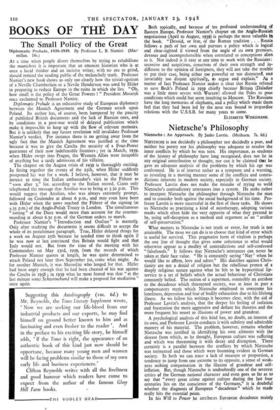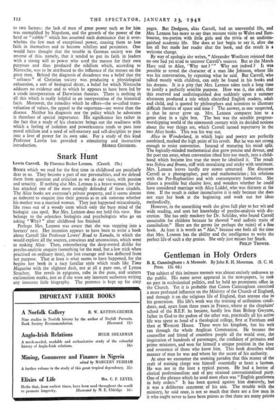Nietzsche's Philosophy
Nietzsche : An Approach, By Janko Lavrin. (Methuen. 7s. 6d.) Nansens •is not decidedly a philosopher nor decidedly a poet, and neither his poetry nor his philosophy was adequate to resolve the inner.conflicts by which he was torn. His importance, as students of the history of philosophy have long recognised, does not lie in any original contribution to thought, nor can it be claimed don he gave an adequate analysis of the problems by which his age was confronted. He is of interest rather as a symptom and a warning, as revealing in a moving manner some of the conflicts and contra- dictions inherent in modern society, especially in German society. Professor Lavrin does not make the mistake of trying to weld Nietzsche's contradictory utterances into a system. He seeks rather to interpret Nietzsche the philosopher through Nietzsche the man and to consider both against the social background of his time. Pro- fessor Lavrin is more successful in the first of these tasks. He shows us Nietzsche as practising a kind of autotherapy, adopting various masks which often hide the very opposite of what they pretend to be, using self-deception as a method and argument as an " artifice of self-preservation."
What matters to Nietzsche is not truth or error, for truth is not attainable. The most we can do is to choose that kind of error which is useful for survival. This pragmatist form of vitalism is perhaps the one line of thought that gives some coherence to what would otherwise appear as a medley of contradictions and self-confessed " falsehoods." It follows that Nietzsche's utterances can never be taken at their face value. " He is constantly saying ' Nay' when he would like to affirm, love and adore." His diatribes against Chris- tianity are not a denial of religion but the rebellious protest of a deeply religious nature against what he felt to be hypocritical lip- service to a set of beliefs which the actual behaviour of Christians constantly belied. The notion of a superman, ostensibly an antidote to the decadence which threatened society, was at least in part a compensatory myth which- Nietzsche employed to overcome his loneliness, depression and fear of bodily exhaustion due to his lifelong illness. As we follow his writings it becomes clear, with the aid of Professor Lavrin's analysis, that the deeper his feeling of isolation and frustration the more aggressive and defiant his theories and the more frequent his resort to illusions of power and grandeur.
A psychological analysis of this kind has, no doubt, an interest of its own, and Professor Lavrin conducts it with subtlety and admirable mastery of his material. The problem, however, remains whether Nietzsche was justified in identifying his own ailments with the disease from which, as he thought, European culture was suffering and which was threatening it with decay and disruption. There certainly is a parallel between the conflicts by which Nietzsche was tormented and those which were becoming evident in German society. In both we can- trace a lack of measure or proportion, a tendency to jump from one extrenie to its opposite, a sense of weak- ness seeking compensation in the illusion of grandeur and self- inflation. But, though Nietzsche is undoubtedly one of the severest critics of the German national character and even goes so far as to say that "every great crime against culture during the last four centuries lies on the conscience of the Germans," it is doubtful whether the diagnosis of European " decadence " which he made really hits the essential point. In his Will to Power he attributes European decadence mainly
to two factors: the lack of men of great power such as for him was exemplified by Napoleon, and the growth of the power of the herd or " rabble " which has assumed such dominance that it over- whelms the few men of exceptional power, causing them to lose faith in themselves and to become nihilists and pessimists. One would have thought that the trouble in German society was the reverse of this, namely, that it tended to put its faith in leaders with a strong will to power who used the masses for their own purposes and thus produced the nihilism which, according to Nietzsche, was to be attributed to the influence of the masses on the great men. Behind the diagnosis of decadence was a belief that the " softness " of Christian society was. producing a physiological exhaustion, a sort of biological decay, a belief for which Nietzsche adduces no evidence and to which he appears to have been led by a crude interpretation of Darwinian theories. There is nothing in all this which is really helpful in an interpretation of the historical facts. Moreover, the remedies which he offers—the so-called trans- valuation of values, the appeal to the superman—are worse than the disease. Neither his diagnosis nor the policy which he advocates is therefore of special importance. His significance lies rather in the fact that a study of his character brings out the readiness with which a feeling of isolation and powerlessness tends to pass into moral nihilism and a need of self-mastery and self-discipline to pass into a love of power for its own sake. For a study of this kind Professor Lavrin has provided a stimulating and instructive































 Previous page
Previous page